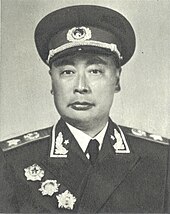Chen Yi


Chen Yi ( Chinese 陳毅 / 陈毅 , Pinyin Chén Yì ; born August 26, 1901 in Lezhi , Chinese Empire , † January 6, 1972 in Beijing , People's Republic of China ) was a Chinese army leader, politician and poet.
Chen Yi was born in 1901 to a middle civil servant in Lezhi, Sichuan Province . He attended elementary and vocational school. In 1919 he managed to go to France as a student trainee , but was deported in 1921 after taking part in a political demonstration by Chinese students. He then studied at the French-Chinese University in Beijing and joined both the Chinese Communist Party and the Guomindang .
From 1926 he attended the Whampoa Military Academy , where he also met Zhou Enlai . After the break between the CCP and Guomindang in 1927, he took part in the unsuccessful Nanchang uprising and, after its collapse, made his way to Mao Zedong's guerrilla base in the Jinggang Mountains . When the Fourth Red Army was formed in 1928, Chen was appointed director of the Political Department.
During the Long March in 1935, Chen commanded a rearguard unit that was supposed to move behind enemy lines and tie up forces - a suicide mission that barely escaped with his life more than once. When the New Fourth Army was formed, Chen became a division commander, and from 1941 commander of the entire army. His army was one of the most important communist armies in the final stages of the Chinese Civil War from 1946 to 1949.
In 1945 he became a member of the Central Committee of the Communist Party of China , in 1956 a member of the Politburo , and from 1949 to 1958 mayor of Shanghai . In 1958, Chen was appointed by Zhou Enlai to succeed him as Foreign Minister.
During the Cultural Revolution he was severely attacked by the Gang of Four and lost his offices in party and government. However, he was still supported by Zhou Enlai; this was evident not least from the fact that after his death on January 6, 1972, he was buried in full honor. His funeral was also Mao Zedong's last public appearance .
| personal data | |
|---|---|
| SURNAME | Chen, Yi |
| BRIEF DESCRIPTION | Chinese army leader and politician |
| DATE OF BIRTH | August 26, 1901 |
| PLACE OF BIRTH | Lezhi |
| DATE OF DEATH | January 6, 1972 |
| Place of death | Beijing |